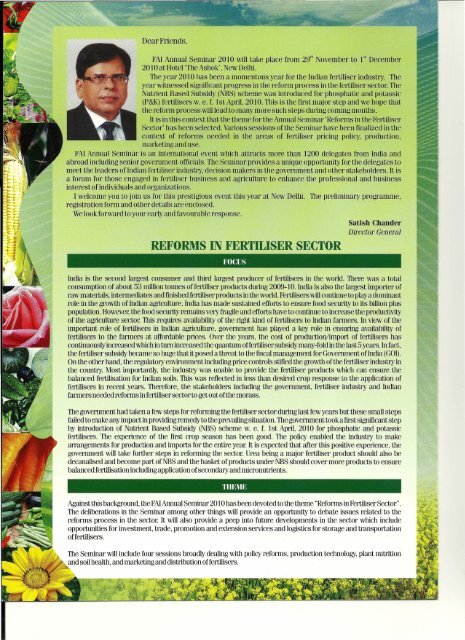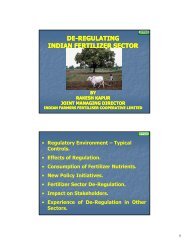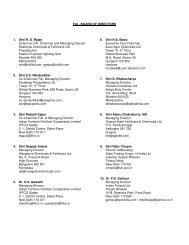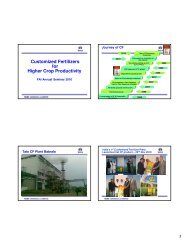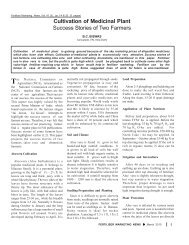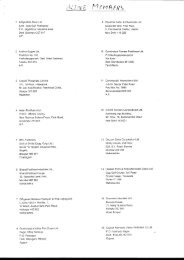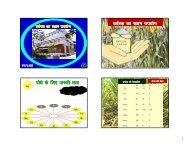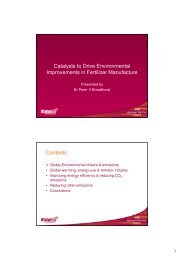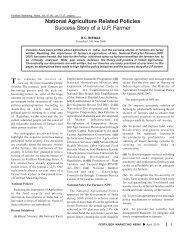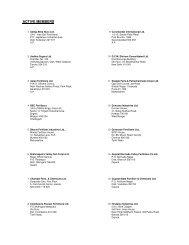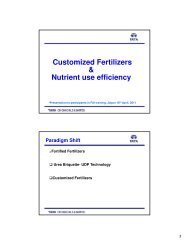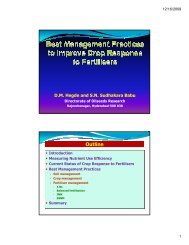The Fertiliser Association Of India
The Fertiliser Association Of India
The Fertiliser Association Of India
- No tags were found...
Create successful ePaper yourself
Turn your PDF publications into a flip-book with our unique Google optimized e-Paper software.
Dear Friends,FAI Annual Seminar 2010 will take place from 29 th November to I" December2010 at Hotel '<strong>The</strong> Ashok', New Delhi.<strong>The</strong> year 2010 has been a momentous year for the <strong>India</strong>n fertiliser industry. <strong>The</strong>year witnessed significant progress in the reform process in the fertiliser sector. <strong>The</strong>Nutrient Based Subsidy (NBS) scheme was introduced for phosphatic and potassic(P&K) fertilisers w. e. f. 1st April, 2010. This is the first major step and we hope thatthe reform process will lead to many more such steps during coming months.It is in this context that the theme for the Annual Seminar 'Reforms in the <strong>Fertiliser</strong>Sector' has been selected. Various sessions of the Seminar have been finalized in thecontext of reforms needed in the areas of fertiliser pricing policy, production,marketing and use.FAI Annual Seminar is an international event which attracts more than 1200 delegates from <strong>India</strong> andabroad including senior government officials. <strong>The</strong> Seminar provides a unique opportunity for the delegates tomeet the leaders of <strong>India</strong>n fertiliser industry, decision makers in the government and other stakeholders. It isa forum for those engaged in fertiliser business and agriculture to enhance the professional and businessinterest of individuals and organizations.I welcome you to join us for this prestigious event this year at New Delhi. <strong>The</strong> preliminary programme,registration form and other details are enclosed.We look forward to your early and favourableresponse.REFORMS IN FERTILISERSECTORSatish ChanderDirector General<strong>India</strong> is the second largest consumer and third largest producer of fertilisers in the world. <strong>The</strong>re was a totalconsumption of about 53 million tonnes of fertiliser products during 2009-10. <strong>India</strong> is also the largest importer ofraw materials, intermediates and finished fertiliser products in the world. <strong>Fertiliser</strong>s willcontinue to play a dominantrole in the growth of <strong>India</strong>n agriculture. <strong>India</strong> has made sustained efforts to ensure food security to its billion pluspopulation. However, the food security remains very fragile and efforts have to continue to increase the productivityof the agriculture sector. This requires availability of the right kind of fertilisers to <strong>India</strong>n farmers. In view of theimportant role of fertilisers in <strong>India</strong>n agriculture, government has played a key role in ensuring availability offertilisers to the farmers at affordable prices. Over the years, the cost of production/import of fertilisers hascontinuously increased which in turn increased the quantum offertiliser subsidy many-fold in the last 5 years. In fact,the fertiliser subsidy became so huge that it posed a threat to the fiscal management for Government of <strong>India</strong> (GOI).On the other hand, the regulatory environment including price controls stilled the growth of the fertiliser industry inthe country. Most importantly, the industry was unable to provide the fertiliser products which can ensure thebalanced fertilisation for <strong>India</strong>n soils. This was reflected in less than desired crop response to the application offertilisers in recent years. <strong>The</strong>refore, the stakeholders including the government, fertiliser industry and <strong>India</strong>nfarmers needed reforms in fertiliser sector to get out ofthe morass.<strong>The</strong> government had taken a few steps for reforming the fertiliser sector during last few years but these small stepsfailed to make any impact in providing remedy to the prevailing situation. <strong>The</strong> government took a first significant stepby introduction of Nutrient Based Subsidy (NBS) scheme w. e. f. 1st April, 2010 for phosphatic and potassicfertilisers. <strong>The</strong> experience of the first crop season has been good. <strong>The</strong> policy enabled the industry to makearrangements for production and imports for the entire year. It is expected that after this positive experience, thegovernment will take further steps in reforming the sector. Urea being a major fertiliser product should also bedecanalisedand become part of NBS and the basket of products under NBS should cover more products to ensurebalanced fertilisation including application of secondary and micronutrients.TIIEI\IEAgainst this background, the FAIAnnual Seminar 201 0 has been devoted to the theme "Reforms in <strong>Fertiliser</strong> Sector".<strong>The</strong> deliberations in the Seminar among other things will provide an opportunity to debate issues related to thereforms process in the sector. It will also provide a peep into future developments in the sector which includeopportunities for investment, trade, promotion and extension services and logistics for storage and transportationoffertilisers.<strong>The</strong> Seminar will include four sessions broadly dealing with policy reforms, production technology, plant nutritionand soil health, and marketing and distribution offertilisers.


